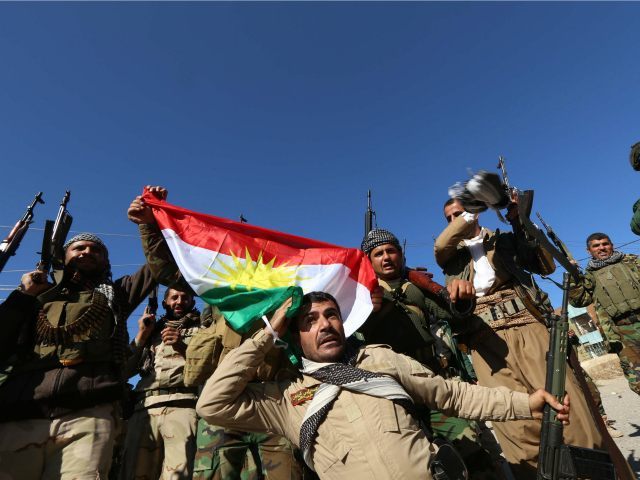An official with Iraq’s Patriotic Union of Kurdistan (PUK) told reporters this week that the Iraqi Kurdish Peshmerga may deploy to Syria to fight the Turkish military if President Recep Tayyip Erdogan insists on “Operation Olive Branch,” the Turkish name for that nation’s invasion of Syria.
Erdogan launched Operation Olive Branch against the Syrian Kurdish People’s Protection Units (YPG/YPJ) last week in response to an American announcement that the U.S. coalition against the Islamic State would create a “border security force” to prevent the Islamic State (ISIS) from reconstructing its “caliphate” in Syria. The YPG has been pivotal American allies in the fight against ISIS. The Turkish government considers the YPG a terrorist group indistinguishable from U.S.-designated terrorist organization Kurdistan Workers’ Party (PKK), a Marxist group.
Mala Bakhtiyar, who the Kurdish outlet Rudaw describes as a “senior official” within the Iraqi PUK, told reporters from Syria that Iraqi Kurdish officials would deploy Peshmerga into the northern Syrian region of Afrin “if they allow us,” referring to Syrian Kurdish officials.
“But,” Bakhtiyar added, “if they allow us, before deploying forces, we will send a delegation to Ankara for dialogue. We prefer dialogue over war.”
Rudaw notes that Bakhtiyar added that deploying the Peshmerga there was “almost impossible”; they would have to travel out of Erbil, Iraq, and cross through territory controlled by a consortium of enemies, including the Iraqi government, Iran-backed Shiite Popular Mobilization Units (PMU) fighters, the Assad-controlled Syrian army, and some limited ISIS fighters.
The Peshmerga has also maintained tense relations with the YPG itself. The Peshmerga has referred to the YPG as “not a disciplined army” and insisted it stay out of Iraq. The YPG has also blocked Peshmerga from entering Syria.
The Kurdistan Regional Government (KRG), which controls the Peshmerga, enjoyed friendly relations with Turkey for years, in part due to their rejection of the YPG and PKK. That changed in September 2017, when then-KRG President Masoud Barzani organized a non-binding referendum on Kurdish independence, rejected by all of the Kurds’ neighbors except Israel.
The politician argued that the “sacred resistance” of the Kurdish people required unity in defense of traditionally Kurdish areas like Kobane, a city that became the heart of the fight against the Islamic State in 2014. In January 2015, a combined YPG/Peshmerga force liberated the city from ISIS control. As Kobane lies on the border with Turkey, Ankara has slowly begun an attempt to remove the YPG from the area.
“Countries of the region, in particular Turkey, knows about our stance in Kobane,” Bakhtiyar insisted.
On its official website, the PUK highlighted a protest Sunday within Iraqi Kurdish territory against Turkey. “On January 21, 2018, the demonstrators chanted slogans against the policies of the Turkish government in the popular demonstrations in which hundreds of citizens participated in the city of Sulaimani,” the PUK claimed.
“Participants in the demonstrations also appealed to the United States to support and protect the city of Afrin and to protect it from the threats and military attacks launched by the Turkish forces on this city,” the PUK statement read.
The United States has largely abstained from participating in this dispute, despite the fact that it was an American coalition statement that triggered Turkey’s military action.
“The Coalition is working jointly with the Syrian Democratic Forces (SDF) to establish and train the new Syrian Border Security Force (BSF),” coalition spokesman Colonel Thomas F. Veale said last week. “Currently, there are approximately 230 individuals training in the BSF’s inaugural class, with the goal of a final force size of approximately 30,000.”
The SDF is an umbrella organization largely made up of YPG fighters.
Some days later, Secretary of State Rex Tillerson denied this statement completely.
“That entire situation has been misportrayed, misdescribed, some people misspoke. We are not creating a border security force at all,” Tillerson insisted.
State Department spokeswoman Heather Nauert told reporters on Thursday that the United States would “certainly [call] on the Turks to not take any actions of that sort,” referring to Erdogan’s threat of an invasion.
While the Trump administration has thus denied the report that caused the invasion and discouraged it, Secretary of Defense James Mattis told reporters Sunday that Turkey “has legitimate security concerns” for launching the invasion.
“We’ll work this out,” Mattis promised, without offering specifics.
Masoud Barzani, who remains a prominent political figure in Iraq despite no longer being president, also urged the Turkish government to end its invasion of Syria on Monday.
“Very concerned about the Turkish attack on the city of Afrin. We hope that these attacks, which have led to the loss of civilian lives are ended immediately,” Barzani said in a statement. “We hope the attacks will end as soon as possible, and that great care will be applied to protecting people’s lives and preventing a further escalation of the situation to avoid any further negative consequences.”
Dictator Bashar al-Assad, technically the head of government for the territory being invaded, has also decried the “brutal Turkish aggression” against the Kurds. The Syrian military and YPG have largely avoided each other, rather than supported or opposed each other, throughout the Syrian Civil War.
“The Turkish aggression on the Syrian city of Afrin cannot be isolated from the policy adopted by the Turkish regime since the first day of the crisis,” Assad reportedly said this week.

COMMENTS
Please let us know if you're having issues with commenting.